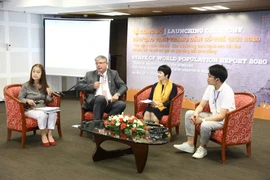Hanoi (VNA) – Vietnam is working on new regulations to better support victims of human trafficking so as to ensure all of them will receive essential assistance and confidently re-integrate into the community.
Completing policies on dealing with human trafficking-related cases, and receiving and supporting victims demonstrates the Vietnamese Government’s commitments to and efforts in the fight against human traffickers.
Combating human trafficking
In the world, trafficking human brings out the third biggest illegal revenue after drugs and weapons. Especially, women and children account for over 70 percent of the total victims. In Vietnam, 60 cases with the involvement of 85 suspects and 90 victims were detected in the first half of 2020. The figures represent a 31.5 percent decrease in the number of cases, and a 40 percent rise in the number of criminals compared with those of the same period last year.
Investigations find out that a majority of victims are women and children who are living in difficult economic circumstances and lack of daily living skills. Therefore, human traffickers often take advantage of the development of social networks to get acquainted with them deceptively and then sell them abroad.
Addressing a meeting in response to the national day for preventing and combating human trafficking held on July 30, Deputy Prime Minister Truong Hoa Binh highlighted complicated developments of human trafficking cases in the world in general and in Vietnam in particular which, he said, have caused serious consequences, violating the most basic human rights and negatively harming socio-economic aspects.
Victims of human trafficking suffer great psychological losses as they are exploited and abused and face high risks of contracting infectious diseases, Binh stressed, adding that the crime does not only inflict mental and physical suffering on the victims and their families but also undermines social ethics and threatens public security.
The Deputy PM affirmed that the fight against human trafficking is one of the primary tasks in the Vietnamese Government’s effort to combat crime.
The country’s Party and Government have put forward many policies and measures to mobilise the entire society’s strength to preventing and fighting human trafficking. Ministries, sectors and localities have strictly followed the national anti-human trafficking programme and actively participated in international mechanisms such as the UN Convention on the Elimination of All Forms of Discrimination against Women, the UN Convention on the Rights of the Child, the UN Convention against Transnational Organised Crime, and the ASEAN Convention Against Trafficking in Persons, Especially Women and Children.
“Closer coordination between judicial offices from the central to local levels has produced good results. Receiving and supporting victims of human trafficking to re-integrate into the community is evidence showing the Vietnamese Government’s commitments to and efforts in the combat against human smugglers,” Binh stressed.
In Vietnam, the successful implementation of the national anti-human trafficking programme in the 2016-2020 period is an important premise to continue proposing the Prime Minister approve the implementation of the programme for the next five years 2021-2025 with a vision to 2030.
Acting Chief Representative of the International Organisation for Migration (IOM) in Vietnam Brett Dickson asked the Government, international organisations and the entire society to join hands in fighting human smuggling, intensifying the assistance for the victims and strictly punishing the traffickers. He affirmed to stand shoulder-to-shoulder with the Vietnamese Government to put an end to human trafficking.
Completing policies supporting victims
To complete mechanisms and policies supporting victims of human trafficking, the Ministry of Labour, Invalids and Social Affairs (MOLISA) is making a draft decree detailing the execution of some articles of the Law on Human Trafficking Prevention and Combat (revised). The decree aims at addressing inadequacies in assisting the victims.
It supplements several groups of victims who are subjected to the support and amend regulations on conditions for receiving support in accordance with requirements.
The decree targets victims of human struggling, social assistance establishments, establishments assisting victims and other related offices.
With the decree, the victims of human trafficking who are uninsured will be granted health insurance cards free of charge. In case they are seriously ill, the cost of medical examination and treatment at the medical facilities will be covered in line with health insurance regulations.
During their stay at social protection establishments, the victims of human trafficking are to be provided with support for essential needs including meals and other items for personal hygiene in accordance with the State regulations on social support policies for those residing in social protection centres./.






























